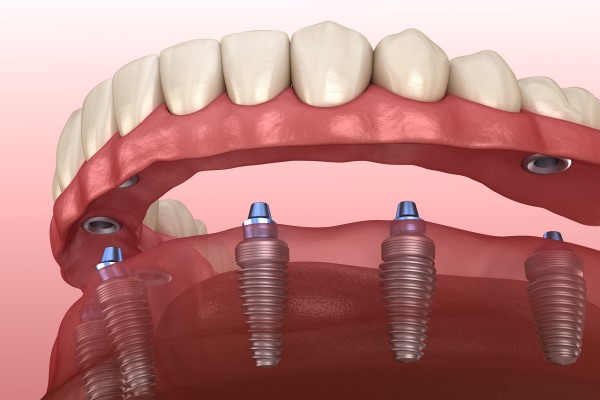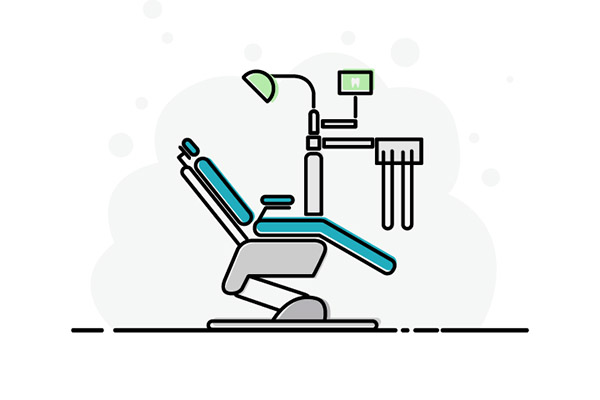Can Implant Supported Dentures Be Removed?

Dentures improve your smile by looking and feeling like your natural teeth. However, they do more than make you feel better about your appearance — they can improve your ability to chew and speak. It can be challenging to do these things if you are missing several or all of your teeth. Dentures support your mouth structure. Without teeth or dentures, your facial muscles can begin to sag. Fortunately, you have several types of dentures to choose from if you have missing teeth.
Implant supported dentures can be a comfortable and practical choice. They are a combination of conventional, removable dentures and full dental implants.
If you are considering implant-supported dentures, you may be wondering if they can be removed like traditional dentures. Of course, the answer depends on which type of dentures you have.
Types of implant-supported dentures
There are three main types of implant-supported dentures. One can be removable or not removable, and the other can only be removed by a dentist.
1. Bar-retained dentures
These dentures attach to an abutment with a bar that curves along the dental arch. The bar may have clips that the patient can attach to the dentures, or the dentures may have clips that the patient can attach to the bar. Some bar-retained dentures have clips and latches on both the dentures and the bar. These dentures are more stable than the traditional type but not as stable as some other types of implant-supported dentures. Patients must learn how to clip and unclip them and remove them at night.
2. Ball-retained overdentures
This type attaches to the implants with ball-shaped abutments that fit into sockets in the base. These dentures can be designed to be either fixed or removable. They are also called stud-attachment dentures.
3. Permanent implant-supported dentures
This variety attaches to the abutment with screws and can not be removed by the patient. These are the most stable implant-supported dentures because they require a minimum of four dental implants to anchor them.
Pros and cons of removable and permanent implant-supported dentures
In addition to being more stable, permanent implant-supported dentures mean less work for the patient. They do not need to be removed at night for cleaning, and the patient does not need to learn how to insert and remove them. Patients can clean this type by brushing the way they would with their natural teeth. It is recommended that patients use a soft-bristled toothbrush and a non-abrasive toothpaste to clean the dentures, gums, tongue, and soft tissues of the mouth. A dentist can remove the dentures during checkups to examine their condition and the condition of the patient's gums. However, these dentures are usually more expensive than other types, and patients may need to use a water flossing device to clean between the dentures and gums. The condition of your jawbone plays a role in whether you are a candidate for implant-supported dentures. Because the jawbone holds the supporting structures, it must be healthy enough to withstand and heal from the insertion procedure.
Removable dentures are usually less expensive and may require fewer implants than permanent models. Some patients may find removable varieties easier to clean because they can be cleaned outside of the mouth. Removable dentures may break down faster than the permanent type and require more frequent replacement. Additionally, they are usually less stable. They can move around while you are eating or talking. There is a greater learning curve with removable models because patients must learn how to insert and remove them and patients are usually advised not to sleep without removing the dentures first.
Conclusion
Like other types of dentures, implant-supported dentures improve your smile. They also keep your mouth healthy by supporting your facial structure and making it easier for you to speak and chew. Implant-supported dentures come in several types that may be either permanent or removable. Each style has benefits and drawbacks that may make it more suitable for some patients than others.
You may have particular reasons or conditions that make one type of implant-supported denture a good choice. The kind of implant and the health of your jawbone are two important factors to consider. Also, it can take multiple visits over several months before the process is complete. All of these factors can go into your decision, so if you have questions about which type of implant-supported dentures are right for you, talk to your dental professional.
Request an appointment here: https://www.drelloway.com or call Randal S. Elloway DDS, Inc at (530) 527-6777 for an appointment in our Red Bluff office.
Check out what others are saying about our dental services on Yelp: Implant Supported Dentures in Red Bluff, CA.
Related Posts
Tooth loss can hurt one’s smile as well as the ability to eat or speak. With implant-supported dentures, the entire look of the smile can be transformed, and individuals can enjoy more freedom with food choices. These dentures are long-lasting and have a positive impact on oral and emotional health.Dentures are a dental tool for…
If you have missing teeth, you may be considering implant dentures. This focuses on using implants to support a set of false teeth. If you are interested, you may want to know more about them. Keep reading to learn about some of the many benefits of this type of denture.Removable dentures can have many issues…
A full denture implant goes beyond replacing missing teeth. It also helps to keep your mouth healthy. A healthy mouth is a part of good overall health. Missing one tooth or more can lead to a variety of dental issues. It can cause the remaining teeth to become misaligned as they try to close the…
Implant supported dentures could be the solution for your tooth loss. Tooth loss can be a devastating and serious problem and it affects millions of people. Have you experienced any sort of tooth loss? You might be wondering which restorative process fits your oral needs. You should consider implant supported dentures. This type of restoration…


